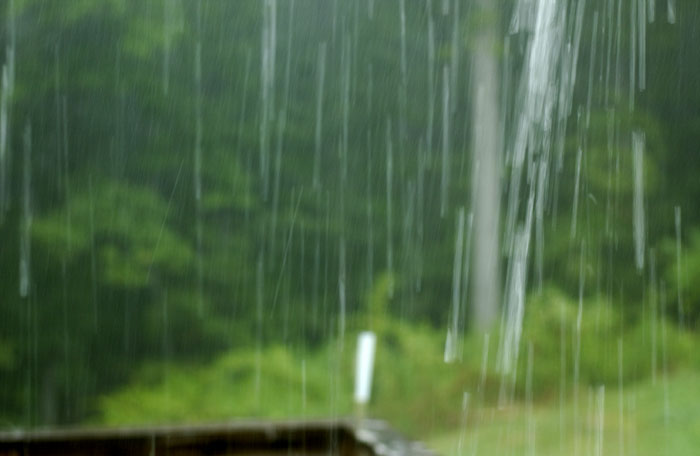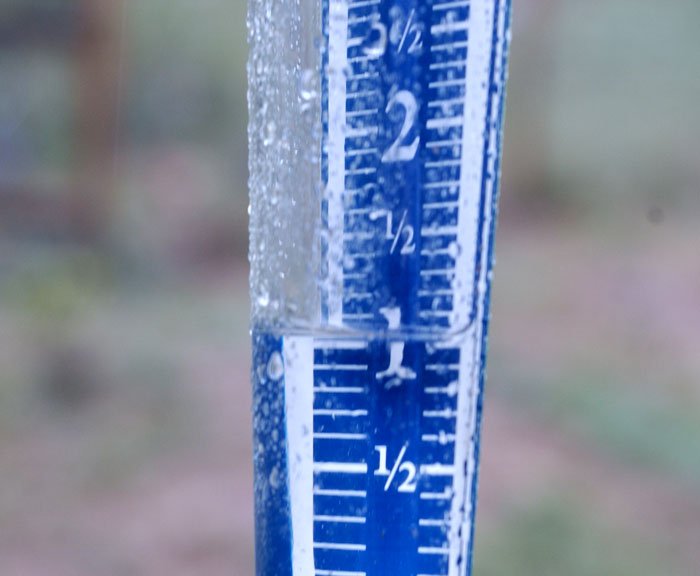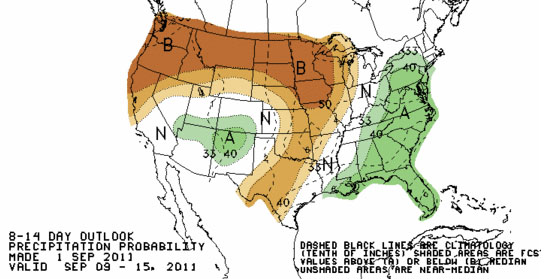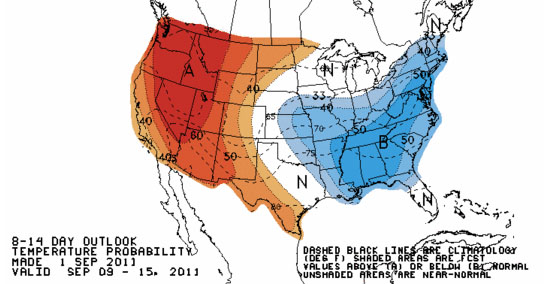I wasn’t expecting rain today, but I heard thunder around 5:30 p.m. and discovered that a good-size storm was bearing down on me, moving out of Virginia headed north to south (not the typical summertime pattern). It left a bit more than an inch of rain.
Not only that, but the 14-day forecast shows the entire eastern seaboard down for below-normal temperatures and above-normal precipitation. If that forecast holds true, then this miserable summer is over. The abbey will soon be green and lush again. I already feel myself transforming back into a human being from the snarling ogre I was during the summer.
By the way, I had a visit this week from Michael, who was Stokes County’s agricultural extension agent for the past five years until he resigned a month ago to work for himself. One of the things he’s now doing is consulting with organic farmers and gardeners like me. I was almost ashamed to have him here while the abbey grounds are looking so parched, but Michael saw right past all that — he lives only a few miles away and deals with the same weather patterns that I’m dealing with. The work that Ken and I have done here (thank you, Ken, wherever you are) got all kinds of gold stars from Michael (especially for the lawn, the orchard, the vegetable garden, the wildflower patches, and the animal habitat), and his message basically was keep up the good work. He did have some great ideas, though, and he solved some of my problems. Such as:
Q. Why did my blueberries die? A. Soil pH. Blueberries like a more acid soil and won’t do well in my orchard area, where I keep the soil well limed for the apple trees.
Q. Why did my fig trees die? A. Replant in an area with morning sun and more water. We picked a spot.
Q. Why did my dogwood die? A. It’s difficult to get dogwoods started under full sun without lots of babying for several years. Replant dogwoods in an area with less sun.
Q. Will anything grow in the darkness under my north-facing deck? A. Jewel weed! This is one of the most magical plants in the world. I’ll post later about jewel weed, with a photo.
Q. What’s the best way to solve my irrigation problem? A. Do some shoveling and enlarge an already-existing pool in my branch which just happens to be at the point where the branch is closest to the garden. Buy a low-cost pump from Harbor Freight. Buy flexible irrigation tubing to run up the hill to the garden and hook it to a soaker system. This will be a winter project.
Q. Can I grow pawpaw trees along my branch? A. Probably not, unless I’m willing to clear some trees over the branch to provide a little more dappled light. Though pawpaw trees might grow by my branch in the existing low light level, they probably would not bear fruit.
Michael also had some excellent ideas, such as planting muscadines on the upper side of the garden fence and raspberries on the woods side of the fence. Both will climb the fence without need for strapping. The other two sides of the fence already have roses, which are growing slowly, but Michael assured me that they would eventually cover the fence. He’s also going to help me find and plant a new shade tree for the south side of the house. I want a shade tree that’s as big as I can find, so that I’ll see some shade in my lifetime.
I doubt that a non-commercial type like me could get this much attention from a county agricultural extension agent, because they’re very busy. So I’m lucky that he’s now working for himself. But that’s something for everyone to keep in mind. I believe that just about every rural county in America has an agricultural extension agent. Expert help is a very good thing. And I’ve learned enough from my experience, and from reading, that I can well understand what a professional horticulturalist has to say.
Climate Prediction Center. These forecasts are updated every day. Your tax dollars at work. What would we do without a strong weather service, information to which every American is entitled, for free? “Entitled” is a beautiful word.




2 Comments
There’s nothing like a summer rain to brighten your outlook. As far as extension agents go, you will find the corn belt sadly lacking in the county based agent. I used to be one in Illinois, where reorganization (because of budget cutting) led to fewer agents covering several counties. And companies are providing their own experts these days, reducing the need for a county agent. The county agent’s job historically was to disseminate information from the land grant university to farmers. With more farmers going to college themselves, and easier ways for everyone to retrieve information, there is less need than ever for the county agent.
I thought paw paws, like dogwoods were understory trees, preferring shady spots. Certainly our woods are full of them. I have always been puzzled as to how there came to be so many, as I usually see only 1 to 2 fruits per tree. I planted some in a shady spot on my own property.
One last thing – my tomatoes have done quite well in years where we didn’t get substantial rainfall. This year I have nice big plants that have yet to produce fruit, and the only thing I can think of is that we had plenty of rain (no I did not fertilize with nitrogen, which can also cause this).
Hi Trish. Yes, pawpaws are understory trees. They also want to be in moist areas, such as beside streams. The wild dogwoods here are found only as undergrowth in the woods, but lots of people do have them in their yards in full sun. I don’t know how they accomplished that, since I can’t. Maybe those dogwoods were planted during wetter summers.
That’s very strange about your tomatoes.
I did not know that you are a former extension agent. That’s wonderful. North Carolina’s land grant university, N.C. State, has done some wonderful work, including helping tobacco farmers make the transition to other cash crops. Even so, Michael said that his biggest frustration in this county was that so many farmers aren’t willing to change how they farm … they just keep doing what they’ve always done. And he mentioned the same budget problems that you mention.
Post a Comment